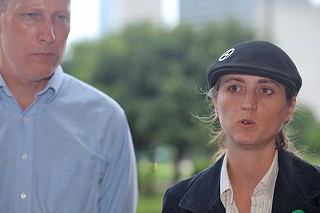Greens Gain Ballot Access in Curious Fashion
Dems question Greens' help from GOP
By Richard Whittaker, Fri., July 9, 2010

The Green Party of Texas has won the second round of a legal fight to place its statewide candidates on November's general election ballot, but it now faces awkward questions about selling out the party's long-held principles.
On July 2, the Texas Supreme Court granted a partial stay on a June 24 ruling by Travis County District Court Judge John Dietz, which barred the secretary of state from certifying the Greens' ballot access petition. This last-minute stay got the Greens under the filing deadline wire with literally hours to spare. The Texas Democratic Party initially sought a further ruling by the Texas Supremes on the legality of the petition, but on July 7 they filed a motion requesting that the court end that part of investigation. Green Party attorney Steve Smith said, "The bottom line is that the Green Party will be on the November ballot."
Democrats claim that the petition, paid for by Missouri-based right-wing nonprofit Take Initiative America, was an illegal corporate campaign contribution intended solely to draw votes away from Democratic candidate for governor Bill White. The Greens' defense is that Texas campaign finance law allows campaigns to use corporate contributions to "defray normal overhead and administrative or operating costs" – and since third parties are not guaranteed ballot access under Texas law, petition drives are a regular operating cost. Smith conceded that the law does not explicitly cover this kind of expenditure but said the rules are less a definitive list and more about ensuring contributions that are reported. He said, "It is something new, but it's not like we're trying to stretch the law."
While the Democrats have dropped their push to get the Greens off the ballot, they're keeping the pressure on their real target: Gov. Rick Perry. They say the petition's paper trail leads straight back to the Governor's Mansion and was orchestrated by Arizona-based Republican operative Tim Mooney, a business partner of longtime Perry political consultant Dave Carney. This isn't the first time Carney has been connected to third-party ballot access shenanigans. In 2004, he was implicated in a similar plan to use corporate cash to get Reform Party presidential nominee Ralph Nader onto the New Hampshire ballot: At the time, the Federal Election Commission rejected a recommendation by its general counsel that Carney and his wife be investigated for knowingly violating the Federal Election Campaign Act.
In the original hearing before Dietz, Democrats also presented evidence of an earlier attempt by Perry associates to get the Greens to accept a suspect petition, an effort they allege involved Perry's former Chief of Staff Mike Toomey, his ex-Special Projects Director Anthony Holm, and his former Communications Director Eric Bearse (now campaign manager for Paul Workman, the GOP challenger to Rep. Valinda Bolton, D-Austin). White spokeswoman Katy Bacon said: "Every week, the number of Perry insiders linked to this ballot scam grows. Texans deserve answers about the illegal corporate money, the secret scheme to sway this election, and what the governor knew."
This still leaves the Green Party of Texas – which campaigns against corporate involvement in elections – in the awkward situation of potentially owing its political future to a corporate contribution. On July 1, League of Conservation Voters Executive Director David Weinberg wrote an open letter asking the Greens to withdraw their candidates; otherwise they would "owe their place on the ballot to funders who do not support cracking down on polluters." In a July 7 statement, Texas Democratic Party Chairman Boyd Richie added, "It is up to the Green Party candidates to decide whether they want to continue candidacies that were bought and paid for by Republicans who hold the Green Party in contempt."
Green Party statewide coordinator kat swift admitted, "We would not have taken [the petition] if we'd known it was from a corporation." But now that they have it, they're prepared to keep it. Swift said: "How do we retract the voices of 92,000 people? ... Those people wanted the Green Party to be on the ballot." Yet the Carney connection places a shadow over who exactly those 92,000 signers are and what their motivation may be. During the 2004 Nader petition drive, guests at a Bush/Cheney rally were reportedly told that getting Nader on the ballot would help the GOP defeat Democratic presidential nominee John Kerry.
Got something to say on the subject? Send a letter to the editor.








